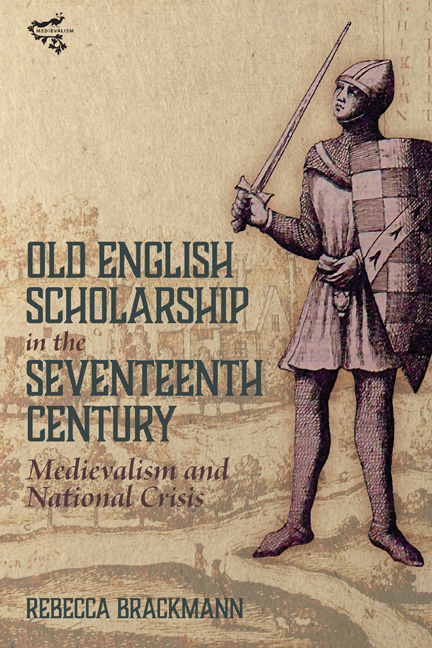Book contents
- Frontmatter
- Dedication
- Contents
- List of Illustrations
- Acknowledgments
- List of Abbreviations
- Note on Quotations
- Introduction: Medieval Studies in a Time of Crisis
- 1 Medievalism, the Self, and the World: Simonds D’Ewes and His Books
- 2 Abraham Wheelock’s Godly Historian: The 1643/1644 Bede
- 3 The Law’s Deep Roots: Roger Twysden’s Edition of William Lambarde’s Archaionomia and Leges Henrici Primi
- 4 Monuments and Memory: William Somner’s Antiquities of Canterbury and Poems on the Regicide
- 5 “The Saxons Live Againe”: William Somner’s Dictionarium Saxonico- Latino-Anglicum
- 6 The Echoing Past: William Dugdale and Early Medieval Warwickshire
- Epilogue: Texts in Conversation: John Milton’s Paradise Regained and the Old English Christ and Satan
- Bibliography
- Index
- Miscellaneous Endmatter
Introduction: Medieval Studies in a Time of Crisis
Published online by Cambridge University Press: 28 December 2023
- Frontmatter
- Dedication
- Contents
- List of Illustrations
- Acknowledgments
- List of Abbreviations
- Note on Quotations
- Introduction: Medieval Studies in a Time of Crisis
- 1 Medievalism, the Self, and the World: Simonds D’Ewes and His Books
- 2 Abraham Wheelock’s Godly Historian: The 1643/1644 Bede
- 3 The Law’s Deep Roots: Roger Twysden’s Edition of William Lambarde’s Archaionomia and Leges Henrici Primi
- 4 Monuments and Memory: William Somner’s Antiquities of Canterbury and Poems on the Regicide
- 5 “The Saxons Live Againe”: William Somner’s Dictionarium Saxonico- Latino-Anglicum
- 6 The Echoing Past: William Dugdale and Early Medieval Warwickshire
- Epilogue: Texts in Conversation: John Milton’s Paradise Regained and the Old English Christ and Satan
- Bibliography
- Index
- Miscellaneous Endmatter
Summary
THE MIDDLE DECADES of the seventeenth century saw tumult arguably unparalleled in British history. Charles I (r. 1625–1649), even more autocratic than his father, James I, incensed English puritans in his promotion of William Laud to Bishop of London (1628) and Archbishop of Canterbury (1633). Many of Charles's subjects disagreed with Charles and Laud about how church services should be conducted, as well as about acceptable behaviors on Sabbath outside of church. Charles lacked both tact and diplomacy, and the Laudian ceremonialists and the puritans opposed to them entrenched in their camps. Charles's other advisors were every bit as unpopular with his Parliaments as his Archbishop of Canterbury. The Duke of Buckingham, whom many English subjects genuinely believed had poisoned James I, was Charles's closest friend and advisor until his murder by a disgruntled former sailor in 1628. In his grief, Charles grew close to his queen, Henrietta Maria of France – a practicing Roman Catholic, whom many English Protestants suspected of trying to convert Charles and the upper nobility back to the Church of Rome. Charles's other chief advisor, Thomas Wentworth, the Earl of Stafford, was similarly hated.
Charles dissolved Parliament in 1629 and for the next eleven years ruled without one – a period now called the “Personal Rule.” However, his desire for religious conformity to his and Laud's ecclesiastical vision not only in England but in Scotland drew him into two disastrous wars with his northern kingdom at the end of the 1630s; between them, he called a Parliament to help fund his army but dissolved it almost immediately. Following the second failed attempt to war with the Scots, Charles called another Parliament – the “Long Parliament” – which ultimately took up arms against him in the Civil Wars of the 1640s. Loyalties were fractured – many people opposed Charles's autocratic rule and ceremonial church but were not willing to war against him. Some insisted on their liberties in the face of Parliamentary taxation and legal proceedings, which became as oppressive as royal exactions and Star Chamber had been during the Personal Rule. After Charles's capture, trial, and execution, Parliament's leadership clashed with its army, several of whose members and leaders were Independents and did not want to embrace the Presbyterian ecclesiastical model that many remaining MPs supported.
- Type
- Chapter
- Information
- Old English Scholarship in the Seventeenth CenturyMedievalism and National Crisis, pp. 1 - 10Publisher: Boydell & BrewerPrint publication year: 2023

